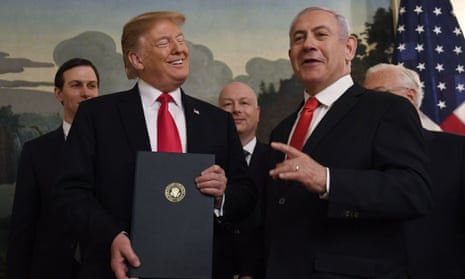It is difficult not to marvel at the scale of Benjamin Netanyahu’s personal achievement. Israel’s prime minister celebrates 10 consecutive years in power on 31 March. His country’s youngest-ever leader in 1996, he has been re-elected three times since 2009, matching David Ben-Gurion’s record. As matters stand, he has a good chance of winning again in polls on 9 April.
Netanyahu’s political achievement is altogether less marvellous. Under his grimly negative, fearful tutelage, Israeli society has shifted steadily rightwards. Attitudes to a peace settlement with the Palestinians have perceptibly hardened. Thanks in large part to Netanyahu’s uncompromising stance, the issue no longer occupies centre stage as it once did.
The peace process is moribund. Netanyahu, aided and abetted by Donald Trump, has purposely allowed it to wither and die. And the divide is widening. If “Bibi” wins again, it will be with the likely backing of far-right nationalists who have demanded that the occupied territories be annexed and all Arabs expelled.
During his first term in office, when Bill Clinton was pushing for progress, Netanyahu coined his “three no’s” mantra – no withdrawal from the Golan Heights, no discussion of Jerusalem’s status and no negotiations with Palestinian preconditions. He has since stuck ever more rigidly to these positions – for example, opposing Israel’s withdrawal from Gaza in 2005.
In the past decade, Netanyahu’s Israel has maintained a simmering stand-off with the Palestinians, particularly with Hamas in Gaza, occasionally interspersed by violence. Meanwhile, illegal settlement activity in the West Bank has expanded, Israel has tightened its grip on Jerusalem, and Netanyahu last year pushed through the so-called nation state law that consigns Arab citizens to second-class status.
Given his political dominance, Netanyahu more than any other individual is responsible for the carnage on the Gaza border over the past year. Israeli army tactics have caused nearly 30,000 Palestinian casualties, about a quarter of whom were shot, the UN says. Israeli casualties have been limited by comparison. But Netanyahu deems the Palestinians to be engaged in “terrorist” activity – thus justifying, in his view, the most extreme actions against civilians. Many Israelis seem to agree with him, and want more of the same – witness opposition and media calls for a more punitive, retaliatory response to last week’s rocket attack north of Tel Aviv.
Netanyahu’s relentlessly destructive, myopic outlook is no surprise. What is surprising, perhaps, is the way the international community, and region-wide events, have combined to facilitate and normalise it in recent years. The most obvious example is the rightward lurch in US policy under Trump, which culminated last week in formal recognition of Israeli control of the occupied Syrian Golan Heights.
The Golan shift was a blatant electoral gift from Trump to Netanyahu. An Arab League summit this weekend in Tunis will reject Trump’s move, and likewise his similar decision last year over Jerusalem. But any condemnation is expected to be muted, given that Saudi Arabia and the UAE have bigger fish to fry.
Active Sunni Arab support for the Palestinian cause is diminishing as fears about Shia Iran, stoked by Netanyahu, grow. The Saudis need US support in their confrontation with Tehran. And for Trump, too, regime change in Iran is far more important than justice for the Palestinians. Similar considerations apply to Egypt, now suffering under the vicious dictatorship of Abdel Fattah al-Sisi. Israel’s blockade of Gaza, the cause of much recent unrest, is jointly undertaken with Egypt. The country that produced Gamal Abdel Nasser and styled itself the Arab world’s leading power now tamely does the bidding of the US and Israel.
Other local and geopolitical evolutions sustain Netanyahu’s reign of impunity. Divisions between Hamas and the Palestinian Authority, and Hamas misrule and miscalculations in Gaza, have frequently given him a free pass. Chronic instability in Syria, and Tehran’s support for Bashar al-Assad’s regime, have, perversely, encouraged his aggressive, security-first policies. The Israeli air force now routinely operates over Syria, attacking ostensibly Iranian military targets – and nobody, not even the Russians, really tries to stop it.
Netanyahu’s success in building a close working relationship with Russia’s Vladimir Putin – the pair have held several bilateral summits – is another key factor, inadvertent collisions in Syria notwithstanding. Their shared approach, ruthlessly prioritising matters of national and personal interest, echoes glutinous Netanyahu-Trump bonding.
Who can change this dynamic and rescue the Palestinians? Truth be told, no hope is in sight. As bodies daily hit the ground under Israeli fire in Gaza, the UN and the European powers look on and do, mostly, nothing. A US-Israeli campaign has discredited the UN human rights council, whose own actions have, in any case, often undermined its credibility. Last Thursday the UN security council flapped impotently over Trump’s Golan demarche.
The result: when the UN decries possible Israeli war crimes in Gaza, few are listening, even fewer are prepared to act – and Netanyahu carries on regardless. Sadly, it’s too soon to bid bye-bye to Bibi.
